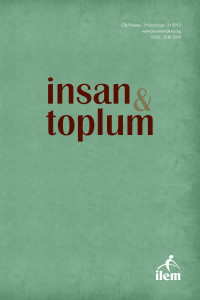Abstract
Her ilim dalı kendi kural ve amaçları doğrultusunda insan hayatını birçok devreye ayırırken, İslâm hukukçuları da terettüp eden hak ve sorumluluklar açısından kişiyi devrelere ayırmışlar; bu ayrımlarda ölçüt olarak fiziki ve aklî olgunlaşma süreçlerini göz önünde bulundurmuşlardır. İslâm hukuk usulünün inceleme alanında yer alan ehliyet bahsinin büyük bir kısmının, çocukluk dönemi ile ilgili olduğu görülmektedir. Kişiyi hak ve sorumluluklara ehil kılan hukukî bir vasıf olan ehliyet, temelde haklardan istifade (vucûb) ehliyeti ve de hakları kullanabilme (edâ) ehliyeti şeklinde ikiye ayrılmaktadır. Bu ehliyetler içerisinde önemli unsurlardan biri ise ceza ehliyetidir. Çocuğun ceza ehliyetine ehil olup olmadığı, hangi yaştan itibaren cezâî sorumlulukla muhatap olacağı, bu sorumluluğun hangi tür müeyyideleri içereceği vb. sorular konunun temelini teşkil eder. Pozitif hukukta da İslâm Hukuku’na benzer yaklaşımlar benimsenmiş, kendi haklarını henüz koruyamayacak durumda olan çocuklar için lehlerine bazı düzenlemelere gidilmiştir. Konuyla ilgili literatüre bakıldığında çocuğun ceza ehliyeti ile ilgili doğrudan araştırma sayısının gayet sınırlı olduğu görülmektedir. Osmanlı dönemi uygulamalarında kanunnamelerden Mecelle ve Hukuk-ı Aile Kararnâmesi’ne kadar gelişen süreçte çocuğun ehliyeti ile ilgili çalışmalar aynı zamanda ceza ehliyetine de ışık tutmaktadır.
References
- Aydın, M. A. (2009). Türk hukuk tarihi. İstanbul: Beta Yayınları.
- Aydın, M. A. (1993). “Çocuk”. Diyanet İslâm Ansiklopedisi (c. VIII, s. 361-363) içinde. İstanbul: İSAM.
- Bardakoğlu, A. (1993). “Ceza”. Diyanet İslâm Ansiklopedisi (c. VII, s. 470-478) içinde. İstanbul: İSAM.
- Bardakoğlu, A. (1994). “Ehliyet”. Diyanet İslâm Ansiklopedisi (c. X, s. 533-539) içinde. İstanbul: İSAM.
- Bilge, N. (2003). Hukuk başlangıcı. Ankara: Turhan Kitabevi.
- Bilgin, B. (2000). İslâm ve çocuk. Ankara: Diyanet Yayınları.
- Cebûrî, H. H. (1988). Avârıdu’l-ehliyye ‘inde’l-usûliyyîn. Mekke: Merkezü Buhûsi’-Dirâseti’l-İslâmiyye.
- Centel, N., Zafer, H. ve Çakmut, Ö. (2005). Türk ceza hukukuna giriş. İstanbul: Beta Basım Yayım.
- Dönmezer, S., Erman, S. (1999). Nazarî ve tatbikî ceza hukuku I-II. İstanbul: Beta Basım Yayım.
- Çeker, O. (1990). İslâm hukuku’nda çocuk. İstanbul: Kayıhan Yayınları.
- Çeker, O. (1999). Osmanlı hukuk-ı aile kararnâmesi. Konya: Bilge Sahaf Kitabevi.
Abstract
Just as every branch of science is devoted to various aspects of human life according to its own rules and purposes, Islamic jurists have devoted themselves to the aspects of human life regarding rights and responsibilities and have considered these distinctions to be a process of physical and mental maturity. In Islamic Law, among the most hotly debated issues is in the domain of individual responsibility of which the majority of this issue relates to the child. The concept of ahliyah (license) is a qualification of a person who is competent in his understanding of legal rights and responsibilities. Ahliyah is divided into two parts: (1) the license to benefit from one’s rights (wucūb) and (2) the license to make use of one’s rights (edā). Among the questions dealt with in this issue are whether a child is competent in his understanding of criminal license, a case that deals with the age which criminal responsibility begins, what responsibilities are included, and what type of sanctions are applied. Islamic law has also adopted similar approaches as has modern positive law. In the two legal systems there are certain regulations in favor of children who have yet to attain the conscious or ability to preserve their rights. It is seen while looking at the present literature written on this matter that direct research regarding a child’s criminal ahliyah is limited to a very small amount. Taking a look at Ottoman applications of these issues, such as the Majallah and Huqūq-ı Aile Qararnāmesi, will help to shed light on the issues presented in the subject.
Keywords
Child Ahliyah (license) Criminal Responsibility Criminal Liability Appeal Islamic Law Ottoman
References
- Aydın, M. A. (2009). Türk hukuk tarihi. İstanbul: Beta Yayınları.
- Aydın, M. A. (1993). “Çocuk”. Diyanet İslâm Ansiklopedisi (c. VIII, s. 361-363) içinde. İstanbul: İSAM.
- Bardakoğlu, A. (1993). “Ceza”. Diyanet İslâm Ansiklopedisi (c. VII, s. 470-478) içinde. İstanbul: İSAM.
- Bardakoğlu, A. (1994). “Ehliyet”. Diyanet İslâm Ansiklopedisi (c. X, s. 533-539) içinde. İstanbul: İSAM.
- Bilge, N. (2003). Hukuk başlangıcı. Ankara: Turhan Kitabevi.
- Bilgin, B. (2000). İslâm ve çocuk. Ankara: Diyanet Yayınları.
- Cebûrî, H. H. (1988). Avârıdu’l-ehliyye ‘inde’l-usûliyyîn. Mekke: Merkezü Buhûsi’-Dirâseti’l-İslâmiyye.
- Centel, N., Zafer, H. ve Çakmut, Ö. (2005). Türk ceza hukukuna giriş. İstanbul: Beta Basım Yayım.
- Dönmezer, S., Erman, S. (1999). Nazarî ve tatbikî ceza hukuku I-II. İstanbul: Beta Basım Yayım.
- Çeker, O. (1990). İslâm hukuku’nda çocuk. İstanbul: Kayıhan Yayınları.
- Çeker, O. (1999). Osmanlı hukuk-ı aile kararnâmesi. Konya: Bilge Sahaf Kitabevi.
Details
| Primary Language | Turkish |
|---|---|
| Subjects | Law in Context |
| Journal Section | Research Articles |
| Authors | |
| Publication Date | June 1, 2012 |
| Published in Issue | Year 2012 Volume: 2 Issue: 3 |


